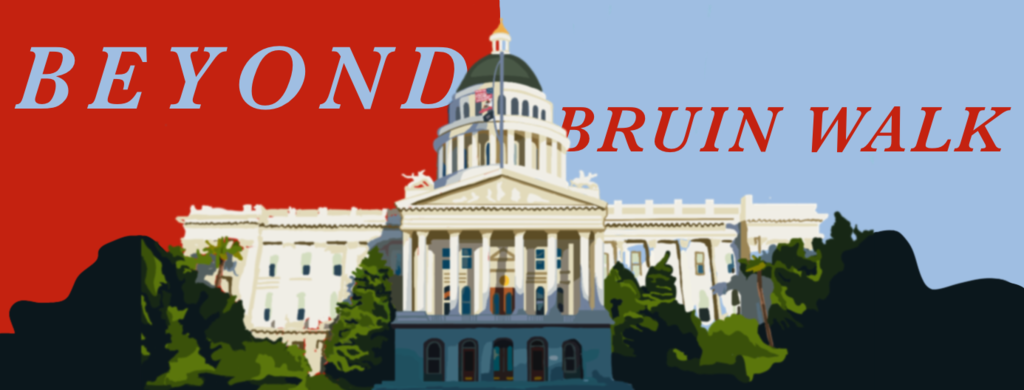Beyond Bruin Walk: California should do more to limit financial contributions to campaigns

(Emily Dembinski/Illustrations director)
Bruins are faced with everyday issues that extend past the immediate confines of their Westwood campus. Daily Bruin Opinion provides the latest commentary on California state and nationwide issues that go far “Beyond Bruin Walk.”
Elections: the pinnacle of democracy and a check on the powers that be.
They’re an honored tradition in the United States. But for special interest groups, they’re an excuse to roam free.
Any Californian will inevitably be familiar with the relentless stream of commercials, texts, emails and calls about this year’s twelve propositions on the state’s ballot. The reason for this never-ending deluge of political ads lies in the staggering amounts of money donors have poured into the initiatives.
As of Wednesday, individual entities have spent roughly $745 million.
While spending millions to garner more votes is morally questionable, it’s not illegal under California law.
In fact, there are virtually no limits to how much individuals can spend on backing or opposing propositions. The only restriction that exists applies to state candidates who have a ballot measure committee contribute at least $50,000 for an advertisement containing their likeness 45 days or fewer from their election.
The result is a system in which well-funded conglomerations can monopolize the information voters receive by spending millions to propagate the same biased narrative.
So much for the freedom of thought.
While grim, the state can fix this dystopian picture by increasing oversight of ballot measure contributions. One easy place to start is contribution caps. Organizations such as the Fair Political Practices Commission, which is an independent organization that enforces fair campaign contribution laws, or the Secretary of State office’s Political Reform Division should work together to set limits on how much an entity can spend on proposition campaigns. Without such a basic restriction, special interests will continue to pool their resources to inappropriately influence voters’ choices.
Money has power – and donors with good reason to defeat a proposition will pounce at the opportunity to do it behind closed doors.
This election cycle, donors have funneled the most dollars into supporting Proposition 22, which would allow rideshare and app-based delivery companies to continue denying their drivers protections promised to recognized employees. Companies like Uber, Lyft and Doordash have already spent more than $150 million on the Yes on 22 initiative, making it the most well-funded campaign in the state’s history.
However, it’s not just cash donations these companies have been contributing.
In a shocking violation of privacy, Uber reportedly gave the initiative a consumer email list valued at roughly $693,000. Under California law, this contribution is labeled as nonmonetary and is therefore an in-kind donation.
Perhaps no better example of the dangers of special interest spending exists than in a megacorporation giving a campaign access to the emails of thousands of users without their consent.
The immediate consequences of this are obvious and dire. The Yes on 22 campaign can reach a vast number of California voters in an intimate and invasive way – something its opponents, who have spent a mere $20 million, can only dream of. This stark imbalance of information means voters won’t get the full side of the story.
Not to mention, the fact that these contributions are considered nonmonetary reeks of resistance to regulation. Any future attempts to cap contributions to ballot initiatives would have to take into account that Uber, Lyft and Postmates were able to collectively contribute almost $6 million in nonmonetary contributions to the Yes on 22 campaign.
It’s true that money isn’t the only driving force behind propositions. In the 2016 general election, voters chose to side with the less funded campaign for five of the 17 propositions. There are myriad factors that influence election outcomes – pinning the blame on money isn’t fair.
But the state seems to understand that finances play a heavy-handed role in elections. Individuals, business entities or political action committees cannot contribute more than $4,700 to state assembly and senate candidates.
Ballot campaigns shouldn’t be any different.
Plus, it’s not like the state has no say over the use of money in proposition campaigns. Ballot initiative committees are required to submit regular reports detailing donor information and contributions to the state’s Political Reform Division. If the regulatory infrastructure is already in place, the next logical step is for the state to impose a monetary cap.
Elections are a time for voters to evaluate the state of their communities. But when corporations have a greater say in determining what gets passed, the state must act.



